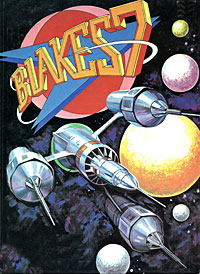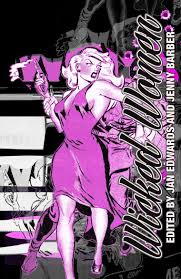Something old, something new
 Yes, yes, I hear you: "Enough with the blog posts about random stuff you like, give us…" Actually I have no idea. If there's something in particular you think I should be blogging about, feel free to leave a comment.
Yes, yes, I hear you: "Enough with the blog posts about random stuff you like, give us…" Actually I have no idea. If there's something in particular you think I should be blogging about, feel free to leave a comment.
For now though: more random stuff I like. One brand new, one golden oldie. For the latter, I give you Blake's Seven.
Seriously, Blake's Seven. Because I like Dr Who (and of course series creator Terry Nation had a rather important role in that too), but I like B7 so much more. And let's face it, it takes a lot to outdo a show that literally has all of time and space as its canvas.
My wife's been watching B7 again recently, and I have been happily reminded of just how well the show stacks up even now. This is a show, like Who, where the sets wobble, or are gravel pits; where the guns would look dodgy to cosplayers; where the early spaceship shots were not even models but basically cardboard cutouts. And it's brilliant. This is a salutary lesson, really. Budgets don't make you great. You only have to look at the Transformers franchise for that. What makes a show truly enduring is the writing and the characters. This isn't some long-lost secret of the elder days of television. There are plenty of series that have succeeded recently on just these merits, despite what seems to be a prevailing belief in the movie industry that an excess of money can make up for a general lack of love and care.
Blake's Seven is built on its characters. Everyone remembers Paul Darrow's Avon and Jacqueline Pearce's Servalan — and rightly so. Both are performances par excellence. They are two among many, though. Villa, Jenna, Travis, Blake himself all grow into enduring and well-realised individuals. And yes, there are some failings — one feels that the showrunners didn't know quite what to do with Gan or Cally (the two crewmembers with "exceptional powers", interestingly — strength and telepathy), just as Farscape would run out of things to do with Zan for perhaps the same reason. At the same time, the show made a particular triumph of making people out of the mechanical — Zen, Orac and the lugubrious Slave were all as important as any of the humans, and although Star Wars (just one year before!) had its droid characters, the computer intelligences of B7 were a remarkable achievement for characters lacking even a mobile body. Peter Tuddenham (who voiced all three) is a true pioneering SF hero. I was going to say something here about the contrast with Dr Who, where artificial intelligence, robots and cyborgs (including the Dr's two greatest enemies) generally equated evil. However K9 was introduced in the Invisible Enemy the year before B7 started, so it's nowhere near so clear cut.
And of course Dr Who is back on our screens and, despite persistent rumours of a reboot, we have yet to see a new B7 (I want to say, "Do we really want one?" but that's probably the old man in me). And yet, I rather feel we have, in a way, because there have been some real spiritual successors to Blake over the years. One key thing here is the set-up — there's a stark contrast to Star Trek, and possibly a strong influence from Star Wars, but the Liberator crew aren't even rebels, with the exception of Blake. They're criminals, bound together by common adversity and self-interest, and that makes for a much more interesting dynamic and more varied plots — we love the escapades of rogues. It's easy to see Blake and the gang in, for example, the crew of Moya as they struggle to escape the Peacekeepers in Farscape, and in the Serenity crew of Firefly as well. More recently, the bickering, diverse and fractious Guardians of the Galaxy are very much from the same mould — and again show that it's not about the CGI or the explosions, but a sharply written script that pays attention to where the characters are coming from and who they are.
So, what's the somthing new?
 Unconnected with Blake's Seven, I wanted to flag up an anthology I've just finished, and which I'm in. So there's my declaration of non-neutrality, I guess. Yes, I am in Fox Spirit's Wicked Women, but seriously, with or without me, it is a sterling connection. Juliet McKenna and Gaie Seabold bookend the collection with very solid additions to their existing canons — Einarinn and Babylon Steel respectively, and in the middle is a remarkable range of stories centring — in many different ways — about the titular concept. I don't think there's a weak story in the set, but I particularly enjoyed the slow-burn ambiguous creepiness of Tom Johnstone's'Kravolitz' and Jaine Fenn's crooked fairy tale 'Down at the Lake', which I had the pleasure of hearing the author read at Bristolcon. Stephanie Burgis's story of post-revolution France was also particularly good, a very nice take on a familiar topic. My absolute favourite was Zen Cho's 'The First Witch of Damansara', however, an exploration of family, grief and tradition that was funny and tear-jerking all in one, and left me quite envious at the depth of characterisation the author managed in just a few pages. Obviously, I always recommend things I'm in, because I'm only human, but speaking as a reader, more than a writer, I really enjoyed this collection and heartily encourage you to give it a try.
Unconnected with Blake's Seven, I wanted to flag up an anthology I've just finished, and which I'm in. So there's my declaration of non-neutrality, I guess. Yes, I am in Fox Spirit's Wicked Women, but seriously, with or without me, it is a sterling connection. Juliet McKenna and Gaie Seabold bookend the collection with very solid additions to their existing canons — Einarinn and Babylon Steel respectively, and in the middle is a remarkable range of stories centring — in many different ways — about the titular concept. I don't think there's a weak story in the set, but I particularly enjoyed the slow-burn ambiguous creepiness of Tom Johnstone's'Kravolitz' and Jaine Fenn's crooked fairy tale 'Down at the Lake', which I had the pleasure of hearing the author read at Bristolcon. Stephanie Burgis's story of post-revolution France was also particularly good, a very nice take on a familiar topic. My absolute favourite was Zen Cho's 'The First Witch of Damansara', however, an exploration of family, grief and tradition that was funny and tear-jerking all in one, and left me quite envious at the depth of characterisation the author managed in just a few pages. Obviously, I always recommend things I'm in, because I'm only human, but speaking as a reader, more than a writer, I really enjoyed this collection and heartily encourage you to give it a try.
 © 2008-2025 Pan Macmillan
© 2008-2025 Pan Macmillan
I loved Blake's Seven, and I do think with the right team behind it, it'd stand up pretty well as a remake. Good luck casting it though; they've left some very big shoes to fill with the original.
Looking forward to investigating the Wicked Women anthology, looks great!